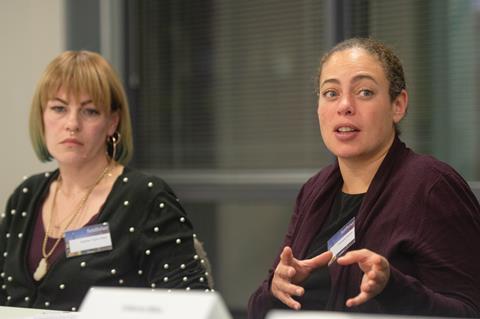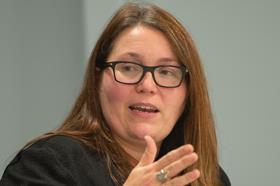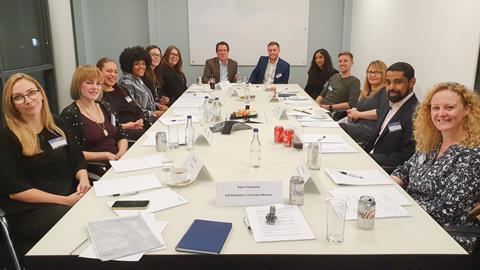Some in the law are happy with the success of schemes to improve the profession’s role in social mobility. But serious problems remain, junior lawyers tell Eduardo Reyes, including the experience of ‘imposter syndrome’ after qualification
Debates about social mobility have a habit of attracting contributions from the great, the good – and the notably privileged. Nick Clegg (son of a bank chairman, three private schools and Robinson College, Cambridge) and Michael Gove (Robert Gordon’s, Aberdeen and Lady Margaret Hall, Oxford) have regularly entered debates on social mobility. This year, Tony Blair (Fettes, Edinburgh and St John’s College, Oxford) has been defending his government’s legacy on social mobility. Prince Charles (Gordonstoun and Trinity College, Cambridge) lobbied ministers, pushing his view that expanding grammar schools was the way to help bright but poor students escape their background.
It is always useful to have allies in high places when promoting a cause. But the danger of their presence in this debate is that other, less privileged voices are crowded out – or simply wheeled on to say a few inspirational words.
This Manchester roundtable discussion, organised by the Law Society’s Junior Lawyers Division, stands out by dint of putting centre stage members who have achieved their rightful place in the profession despite disadvantages in (variously) social background, schools, caring commitments and financial barriers. Also at the table are people at two law schools charged with improving the diversity of their student intake, and national and Manchester Law Society staff and officers.
The event is the start of a process that JLD committee member Adam Hattersley, an associate at commercial law firm Fieldfisher, plans to culminate in a JLD report on social mobility in the legal profession next year.

We begin with a discussion on schools and pupils. ‘Speaking from personal experience,’ Hattersley says, ‘the careers guidance at state schools is shocking.’ That matters more when pupils do not come across lawyers through the circle of family and friends. ‘I didn’t know any lawyers who sounded like me,’ he adds. ‘It just didn’t seem like [a legal career] was on the table.’
Appreciation of that very basic barrier has led to initiatives aimed at schools. Stephanie Lee, charged with widening participation at the University of Manchester, says: ‘Access to networks and access to professionals… that’s something that we can definitely do something about by creating those connections and creating those opportunities.’ She stresses the importance of ‘developing that sense of confidence in those younger people’ so that they are ‘able to see themselves in that kind of environment, whether it is the university environment, or within the legal profession’.
Such initiatives sometimes need to be highly targeted, her colleague Catherine Millan says: ‘For someone at the age of 13, 14 who goes to a state school in places like Gorton or Moss Side, nobody was really going in and speaking to them about becoming a solicitor, about becoming a barrister.’
Within those contexts, Millan identifies a ‘crisis group’ that required ‘very early intervention to plant that seed’ – black male pupils who have become the focus of her work on the Black Lawyers Matter project.
She explains: ‘Part of the programme involves black law students going into schools and doing workshops, with years eight to 10. Those particular pupils then become eligible to attend an “Explore Law” day. We’ve run the Explore Law day twice, and we’ve had over 100 black males attend with their teachers… it’s just a really great opportunity for the boys to come in to a particular space… to feel – this is something for me, this is a profession I can see myself in, because there’s somebody who’s sat in front of me who’s been through it and has done it.’
It is early days for this scheme, but Millan says every school she has contacted has wanted to be involved.

Hard-pressed schools can be harder to engage. Fieldfisher solicitor Chris Benn has been actively involved with the Social Mobility Business Partnership. ‘Some of these schemes are available,’ he notes, ‘but actually kids are not getting the opportunity to come to them because the teachers can’t put the time in to build the connections and then get them the access to it.’
Sparking such ambition will, though, be setting up some aspiring lawyers to fail, unless universities and law firms can make decisions on ‘how we address the attainment rates’, Lee says, ‘particularly in schools in more disadvantaged areas where often the attainment rates are below the national average.’ It is possible, she says, to ‘use the autonomy that we have as universities, in terms of our admissions system, and provide flexible admissions,’ using ‘contextual data to try and identify students with potential.’
‘I’m not sure, as universities, that we can significantly increase attainment within schools. I think that’s the job of schools, but we can do something around our admissions system to try and reflect some of the educational disadvantages that those students would have experienced.’
If universities have got that process right, the students they admit from lower-attaining backgrounds and schools, who have lower grades, will make more progress in higher education than non-target groups. They will achieve finals results in line with the general standard of all pupils, Sutton Trust research shows.
But in the legal profession, such students then face a further barrier. Many law firms still filter candidates by A-level grades. ‘If universities are applying contextual [data in] admissions and then students are getting 2:1s and firsts, but if they’re still being judged on their A-level qualifications then that’s undoing the good,’ Lee points out. ‘Barriers have been removed, but then they’ve been introduced at a later stage.’
Perceptions
Others say that not all barriers to law are ‘hard’ barriers such as A-level or degree classifications. Hattersley notes the importance of perceptions about which university candidates attended.
‘I naively thought that grades were preventing people from attending the more prestige universities like the Russell Group universities. I thought, well, if you went to a state school, you probably weren’t going to get the grades,’ he says, but research shows this is not the case.
‘Of the people who are getting the As and the Bs, people from state schools are applying to a much wider range of universities,’ because they are not guided by (for example) parents who know the importance to a profession of attending ‘prestige’ universities.

JLD chair Amy Clowrey shares her experience of choosing a university, following excellent GCSE and A-level results. She chose the nearest place she had an offer from. ‘Had I known what I know now, I would have gone to somewhere like the University of Manchester,’ she says. ‘But I didn’t. I went to an ex-polytechnic, which therefore limited my ability to get training contracts.’ She praises the standard of teaching at the university she chose, but observes that law firms mostly did not make the effort to come to it, and it was therefore not as good for making connections.
Others note that choice of university can be limited by personal circumstances, from lacking the confidence to take on debt incurred by living independently, rather than with family, to caring responsibilities and other pressures.
Siobhan Taylor-Ward, a committee member of Young Legal Aid Lawyers and trainee solicitor at Merseyside Law Centre, has a Justice First fellowship. She chose John Moores University ‘because if you did your GDL at John Moores, you got a discount on your LPC’.
She adds: ‘Loads of our members always tell us things like that – that it’s about where’s the cheapest. Especially when you’re from a working-class background, it feels terrifying to spend so much money, even if it’s a loan.
‘It’s not necessarily that the cheapest is the worst either,’ but ‘it feels that it’s a problem’ for some employers.
Law firms, including large and hugely profitable commercial firms, are among those offering a route to qualification as a solicitor via an apprenticeship. The University of Law’s Catherine Morgan, who is an apprenticeships skills assessor for ULaw, outlines the risks of this route for some. ‘It is going to completely depend on the firm they get the job at when they’re 18,’ she says. ‘When you’re 18, you don’t really know what you want to do, and what does a personal injury lawyer mean, what does a corporate lawyer mean?
‘I’ve had one apprentice who’s done her apprenticeship at the BBC… She’s got a degree at the end of it, she’s going to have no debt, she’s been paid, the experience she’s getting is phenomenal. Any law firm will snap her up at any moment. She has absolutely not been disadvantaged. It’s been a massive success for her.
‘Then you’ve got others,’ she notes, ‘that are perhaps at smaller claimant PI law firms who are, by the time they’ve hit 20, desperate to get out. But unfortunately, because they’re getting their degree [this way feel that they can’t]. What do they do?’
Working holiday
Internships and vacation schemes have, in practical terms, become a prerequisite for attaining a training contract. It can be a struggle to get an interview without such experience on a CV. It is also the case that some paralegals who want to secure an internship at a firm they aspire to work at are contractually prevented from doing so by the firm they work for. A requirement of vacation-scheme or internship experience also assumes that students have had the time, opportunity and any necessary finance to apply for and take these opportunities.
Morgan uses one of her students as an example. ‘She had a year where she [was] doing 40 to 65 hours a week working in a bar job, to save as much money as she can to study. She’s now studying full-time, but she’s still also working 30 hours a week in her bar job. Now she is wanting to apply for top firms, and she’s great, she’s absolutely super. She’s got a first, she has nothing else on her CV, she has got no extra-curricular activities.’

For this candidate, Morgan asks: ‘What is she going to draw on for her experiences to evidence the skills and to compete with people who are interning at The Hague? It’s not just the studying, it’s that extracurricular bit that the law firms are wanting that is going to make you stand out.’
Francesca Gardner, a barrister at King’s Chambers who organised a programme called ‘Making Connections’ with the charity Reclaim, remembers facing a similar problem. She says candidates need help and encouragement to present and explain their wider experience.
In her application to King’s Chambers, she recalls identifying the team-building and organisational skills she’d acquired ‘working back-of-shop in Boots’ and the same for a factory job she had taken. ‘Whatever your job is, have pride in what you’ve done and find the skills within it that you can sell,’ she advises.
‘That’s something that I think is so key for working-class kids. We really need to instil this in them because those kids [aren’t] having opportunities that the kids from private backgrounds are… getting.’
Michelle Garlick, a partner at Weightmans and president of Manchester Law Society, says firms should free up lawyers’ time to help aspiring practitioners with skills such as CV-writing and filling in application forms, and boosting the confidence of applicants. ‘Social mobility isn’t really thought of as [corporate social responsibility],’ she says. ‘There is absolutely no reason why it couldn’t be.’
Who do vacation schemes benefit? It depends, those present say. Hekim Hannan, a member of the Law Society’s Ethnic Minority Lawyers Division and solicitor at Browne Jacobson, says one use is as a marketing and recruitment tool for law firms. For the most highly prized candidates, he says, ‘they want you as early as possible… before anyone else gets you’. Typically that means offering opportunities to law students at ‘Oxbridge and red-bricks’ at the end of their second year.
HOW THE LAW SOCIETY CAN HELP
- The Diversity Access Scheme (DAS) is a scholarship which identifies exceptional students who have a strong ambition to qualify as a solicitor but who, without support, will almost certainly be unable to realise that ambition. The DAS provides support to talented aspiring solicitors. The scholarships enable students to complete the LPC and the scheme helps them gain relevant work experience. It also puts them in touch with solicitor mentors.
- The Law Society will be relaunching its Diversity and Inclusion Charter at the end of this year. The charter was established in 2009 by the Law Society, BT and the Society of Asian Lawyers. It is designed to help firms and practices turn their commitment to diversity and inclusion into positive, practical action for their businesses, staff and clients.

- The Social Mobility Ambassadors programme was launched in October 2015 to promote diversity in the profession through solicitor role models. The project showcases accomplished members of the profession who have overcome socioeconomic challenges to pursue a legal education and succeed in their careers. Ten new ambassadors are chosen each year.
- PC Holder survey, which deploys a representative sample of 1,500 solicitors, asks a series of detailed questions on social mobility. In 2018 it showed 12% of PC holders had been eligible for free school meals, and 52% were in the first generation of their family to attend university.
For more information, click here.
Manchester Young Solicitors committee member Natasha Najran, a solicitor at Fieldfisher, says a scheme should give a student important insights and experience. ‘I sit next to the vac-schemers when they come and I give them the same work that I would give a trainee. I always say to them, “I’m not expecting you to be able to do exactly what the trainee would do, this is to give you an idea of what you’ll be working on”. Then I just say to them, “Let’s have a chat as you’re going through it. If you’ve got any questions…” Then afterwards we look at what they’ve managed to pick up on. It’s a bit like a comprehension exercise.’
The discussion turns to the experience of lawyers post-qualification. Hattersley relates a theme that emerges when he asks lawyers from non-traditional backgrounds about their experience post-qualification. He asks this because retaining those lawyers has been identified as an issue. For many, he says, ‘as soon as they had qualified, they found that their career’ involved ‘either a feeling of imposter syndrome or a feeling of not fitting in. A feeling of needing to change who they were on a personality level’.
These lawyers worried about whether, because of their background, ‘they would be held back’, or ‘weren’t being given the right kind of work… were being overlooked for promotion’. This was not universal, he notes, adding in his own case that ‘it had not even crossed my mind’.
This is a source of stress for some. One notes the experience of a relative – a black, female corporate lawyer – who shared her experience and feelings. ‘I go into a room sometimes and if I’m with a white male, they’ll assume that he’s taking the lead… I have to think about the way that I speak… if you want to work for the big law firms, or you want to work within this industry, you have to think about how you look… when you’re someone who comes from a particular cultural background, that is so far from a corporate world… it is a barrier.’
Hannan, who is from Liverpool, identifies a dual pressure here: ‘When I’m in Liverpool, people speak to me and say, “Oh, how long have you lived here?” … and in London, “Your accent is so thick and so strong.” So you never quite fit in anywhere. But when you’re first starting out in your profession, you just want to fit in, because you know you’re different, you don’t want everyone to point it out… So, you’re so careful.’
What would lower the risk of such pressure pushing out lawyers, who after all have achieved so much in qualifying and starting to practise? Perhaps more visible difference in the ranks of the law, Taylor-Ward reflects. She was the Gazette interview for the My Legal Life page earlier this year. ‘Loads of people messaged me to say, “Thanks so much for putting that in, it’s so nice to see somebody that’s not the normal person”. [Or], “I’m a single mum as well, and it was really good to see”… so obviously even grown-ups that are already in this world feel it’s nice to have a reflection. For kids, it’s even more important.’
- This roundtable was organised by the Law Society Junior Lawyers Division, and kindly hosted by Fieldfisher, Manchester
- For more information on the JLD, contact: juniorlawyers@lawsociety.org.uk
-
Photography by Cavendish Press
































1 Reader's comment